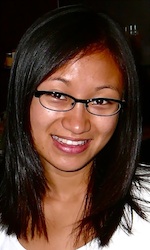One term bandied about at the Buddhism without Borders conference was cradle Buddhists. I believe Thomas Tweed gets credit for this term, one which aims to refer to Buddhists who grow up in Buddhist families, regardless of whether their families have been Buddhist for over a thousand years or whether their parents quit Catholicism and joined a Zen Center in the seventies. As Wakoh Shannon Hickey discussed problems with different Buddhist typologies, she made a side comment that perhaps I would be satisfied with the term cradle Buddhist.
Well, I don’t like it.
For the record, I appreciate the motivation behind this term, that it transcends the racial (dare I say racist?) undercurrent in the common day use of other terms like ethnic Buddhists and immigrant Buddhists. But to be very plain, this term is infantilizing. I’m also perfectly happy associating with another term that darts about the literature: heritage Buddhists.
For those of us who like to hang out in Asian America, the term heritage Buddhist is very powerful. This expression conveys the very true sense that Buddhism is woven into the fabric of our cultural heritage. Like the broad sense of the term heritage speaker, it includes both people who imbibe Buddhism through their childhood milieu and also those who later come to Buddhism through a sense of affinity with their cultural heritage. Heritage Buddhist gets at how we see ourselves.
Heritage shouldn’t be understood in contrast to convert. Several of my friends identify as both convert and heritage Buddhists. They are not born into Buddhist families (i.e. they’re not “cradle Buddhists”), but they also relate to Buddhism through a sense of familiarity or belonging. At the same time, many of us “cradle” Buddhists very much turned our backs on the Buddhism of our childhoods, only to be drawn back to different forms that diverge radically from the traditions we first experienced. One example is in the growing interest in the Vietnamese community for Theravada Buddhism. So while still heritage Buddhists, many of us are also converts within our own religion.
Lastly, don’t overlook the distinction of the growing pool of converts’ children (Dharma brats?) and their children out there. I’m happy to call them heritage Buddhists too, but this group grapples with some very unique issues that deserve to be understood in the context of their unique identities and upbringing. I’m not sure that plopping all of us down in the same cradle—as opposed to converts and sympathizers—appropriately reflects differences in both how we act and also how we see ourselves.
So scholars, maybe think about revisiting the term heritage Buddhist. If there’s an exceptional moral/academic imperative behind the term cradle Buddhists, is it so hard to instead talk about “Buddhists raised in Buddhist families”? Maybe I just dislike being institutionally infantilized.
What better term can you think of to replace cradle Buddhist?
